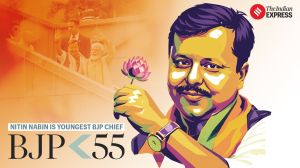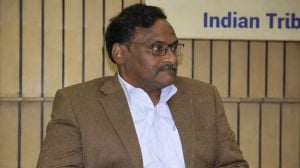I will not give up
Her husband's death was a mystery. But slain DSP Zia-ul-Haque's gusty widow Parveen Azad is doing all she can to bring his killers to the book. Ramendra Singh meets her at Haque's village Zuafar. She relives her memories with Haque,and talks about her fight for justice
In Zuafar,a Muslim-majority village in Deoria district,eastern Uttar Pradesh,a woman would confine herself in purdah after her husband8217;s death. But Parveen Azad has set a precedent in this hamlet of about 1,000,much like her husband,slain DSP Zia-ul-Haque,who,in 2009,created history in Zuafar by becoming its only Class 1 officer.
Every day,she emerges from her spartan house to sit on a charpoy and talk to activists,politicians and journalists. She would earlier attend to the visitors alone,but after local newspapers reported that she was deserting her in-laws,she is now accompanied by her mother-in-law Hazira,father-in-law Shams-ul-Haque and brother-in-law Sohrab during the interactions. These days,many people visit us and ask questions. My father-in-law is gullible. People blow up his innocent remarks, she says.
Her fiery attitude has probably spurred on the gossip in the conservative village. Soon after her husband8217;s murder,Azad had lodged an FIR against then minister Raghuraj Pratap Singh,alias Raja Bhaiyya,for allegedly conspiring in the crime. She also refused to bury Haque8217;s body and staged a dharna in Zuafar till her demands were met,sending UP chief minister Akhilesh Yadav to rush to the village. She handed him her letter of demands,which included the arrest of Raja Bhaiyya,a CBI probe into the murder and employment to needy persons of her family. In no time,Raja Bhaiyya resigned from the cabinet,and a CBI probe was ordered.
l l l
Born to a schoolteacher from Khudaibari village in Siwan district of Bihar,Azad had a different upbringing from her husband. Her education was smooth,despite a a large family size four sisters and a brother. After a BSc where?,she did her post-graduation in philosophy from Aligarh Muslim University,and later enrolled for Bachelor of Dental Surgery BDS at Babu Banarasi Das University in Lucknow. Meanwhile,her father,Badruddin Azad,found a groom for her in Haque.
Haque,with his two elder sisters and a younger brother,spent his childhood in poverty. His father earned little as a helper at a restaurant in Mumbai,and yet managed to educate Haque at the village school,and then at a college in nearby town Khukhundu. When Haque enrolled for graduation at Allahabad University,he gave tuitions to fund his education. And when he was selected for the Provincial Police Service PPS,he became a role model for Zuafar. And a groom fit for Azad.
The marriage was fixed by their parents. They never met each other,only saw each other8217;s photographs. The wedding took place on January 21,2012,at Azad8217;s home in a traditional ceremony. Within days of our marriage,we became friends and would talk to each other for long. Ours was not a traditional household. I was a student living as a paying guest in Lucknow. He was a police officer posted in Ambedkar Nagar with very little scope for leaves, Azad recalls,her face composed,with suppressed emotion.
Every Saturday afternoon,she would leave her college early,and with her backpack still on her,she would catch a bus to Aalapur,and then Kunda,where her husband was posted. I would try to experience as much of his life as I could. I would also accompany him during his routine checks. He would joke that I was like Sonia Gandhi who accompanied Rajiv Gandhi everywhere, she says,with a faint smile.
Whenever he would feel let down by his work,she would inspire him with stories of emperors and their victories,and give him DVDs of historical movies. Ever since he was posted in Kunda,about six months ago,he would often feel depressed. He never went to Raja Bhaiyya8217;s durbar. He also got some threats for this. He would often say that it was very tough to work in the area. He would walk to and fro without talking to anyone. I used to counsel him not to worry and keep performing his duty, she says. He,on the other hand,would ask her to be more serious about her career. I often tried to bunk classes on Monday but he would protest,prepare my bag,wake me up and see me off at the bus stop, she says.
Azad and Haque did not want to live such a life for so long,and were making plans for a change. We were planning to settle down in Lucknow,have a house in the city,and shift our family there too. He was preparing for IAS examination and wanted to open a dental clinic for me in Lucknow. He would often ask me to become capable of taking care of our family in case of any difficulties, she says. Now that tragedy has befallen upon them,it seems Azad8217;s advice was borne out of premonition.
Azad seems to shrug off that thought,and recalls his love for Urdu poetry. Haque was popular among his friends and family for his knowledge of Urdu poetry. An Urdu couplet was an integral part of all his arguments. His sentences often started with a couplet. He had a large collection of poetry books. He was specially fond of funny shayari, she says.
On December 25,Haque8217;s birthday,she gifted him a collection of Akbar Allahabadi8217;s poetry. Azad says Haque had asked her to gift her poetry books instead of costly presents. I asked him to provide me a list of books he wanted to read so that I could gift them to him, she says. She gifted him a book of Parveen Shakir8217;s poetry on their first marriage anniversary,a little more than a month before he was killed.
Family members say Haque was a private person who would not mingle much with others,but was jolly at home,cracking jokes and reciting comical couplets. After my father first met Haque as a prospective groom in Ambedkar Nagar,where he was posted as a circle officer,he said the boy laughs more than he speaks. My sisters and I wondered what sort of a person laughs more than talks. But,in the last one year I spent with him,I became like him. Those who knew me before my marriage often said aajkal tumhara munh khula hi rahta haiyou laugh a lot these days, she says.
l l l
The day Haque was killed March 2 happened to be a Saturday,when she would go to meet him every week. But that Saturday,Haque was planning to come down to Lucknow. He was waiting for the SP to sanction his leave. Even though I insisted that he came on Saturday night itself,he said he would come on Sunday morning,only after his boss would let him, she says.
Azad says she called him around 7 pm to check if his leave was sanctioned. His private number was busy for a long time,and his official number unreachable. I called up his his office,and they told me that he had gone to a village where firing had taken place, she says. It was only from TV that she learnt her husband was injured in the firing. I called the office again,and they confirmed the news of his injury. I hired a cab and left for Kunda. When I reached the police station there,no one was telling me what exactly had happened. Upon my request,the SP arranged a jeep to take me to the hospital in Pratapgarh. When the car stopped near the emergency block,I felt relieved that he was just injured. But when they took me towards the mortuary,I knew everything was gone. It was a dark room,and I could not see his body I only touched it,and felt his head covered with blood,his face damaged and his clothes filled with mud.
l l l
Azad says her husband8217;s killing was the worst fate a policeman could face. It was not the martyrdom which is felt when one dies fighting for one8217;s country. His killing was a conspiracy his subordinate officers left him to get beaten up and shot dead. If he had died fighting criminals,I would not have been so angry says Azad.
Even as the dust settles after Haque8217;s death,Azad is making plans for the future. Her final exams are in May,and she will go back to Lucknow soon. She says she will take up the government job offered to her,and continue her fight for justice. The children of Zuafar had found a role model in Haque. I don8217;t know what they think after his murder. I want to give them the message that no one is powerful enough to take away somebody8217;s life, she says.
For now,Azad is tracking the CBI probe through newspapers,as they don8217;t have a television set. She has already sought the details of the the CBI team probing the case. She has demanded that there should be day-to-day hearing of the case and the court must be set up outside UP.
Recently,she made a call to the chief minister8217;s residence but could not talk to him. She wanted to tell him that its been more than fifteen days since her husband8217;s death but she has got no letter for job or security from the government. I know it is not easy to get justice when you are fighting against powerful persons. But I will not give up, she says.
- 01
- 02
- 03
- 04
- 05































